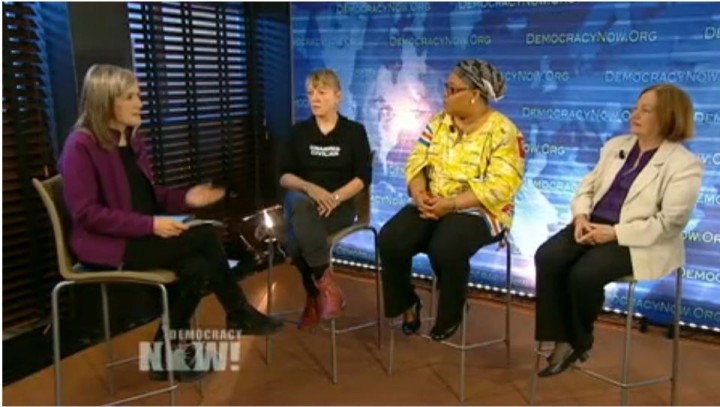We broadcast live from The Hague, where over 1,000 female peace activists gathered from around the world 100 years ago this week to call for an end to war. The extraordinary meeting, known as the International Congress of Women, took place as World War I raged across the globe. Today, as wars rage on in Afghanistan, Iraq, Syria, Libya, Yemen and other countries, women from around the world have gathered again in The Hague to call for peace and to mark the 100th anniversary of the Women’s International League for Peace and Freedom. In a Democracy Now! exclusive, we speak with three Nobel Peace Prize laureates. “Their agenda is to end militarism and war, and to build peace and international law and human rights and democracy,” says our first guest, Mairead Maguire, who was awarded the 1976 Nobel Peace Prize at the age of 32 for her actions to help end the deep ethnic and political conflict in her native Northern Ireland. She shared the award with Betty Williams. They helped start Peace People, a movement committed to building a just and peaceful society in Northern Ireland. At the time, Maguire was the youngest recipient of the peace prize. She is the author of the book “The Vision of Peace: Faith and Hope in Northern Ireland.”
Transcript
This is a rush transcript. Copy may not be in its final form.
AMY GOODMAN: One hundred years ago this week, over a thousand women peace activists gathered from around the world to meet here at The Hague to call for an end to war. The extraordinary meeting, known as the International Congress of Women, took place as World War I raged across the globe. The gathering was organized by a Dutch suffragist named Dr. Aletta Jacobs. The event took place in The Netherlands because of its neutral position during World War I. At the event, Dr. Jacobs said, quote, “Those of us who have convened this Congress of Women assembled to protest against war and to suggest steps which may lead to warfare becoming an impossibility,” she said. Two future Nobel Peace Prize winners took part in the U.S. delegation: Jane Addams, the co-founder of Hull House in Chicago, and the sociologist Emily Greene Balch. The event marked the formation of the Women’s International League for Peace and Freedom, known as WILPF. Well, today, as wars rage on in Afghanistan, in Iraq, in Syria, Libya, Yemen and other countries, women from around the world have gathered again here in The Hague to call for peace and to mark the 100th anniversary of the Women’s International League for Peace and Freedom.
In a Democracy Now! exclusive today at The Hague, we’re joined by three Nobel Peace laureates. Jody Williams is with us. She won the Nobel Peace Prize in 1997 for her work with the International Campaign to Ban Landmines. In 2003, she helped launch the Campaign to Stop Killer Robots. Her memoir is called My Name is Jody Williams: A Vermont Girl’s Winding Path to the Nobel Peace Prize.
Leymah Gbowee is also with us. She received the Nobel Peace Prize in 2011 for her work in leading a women’s peace movement that brought an end to the Second Liberian Civil War in 2003. Gbowee shared the prize with fellow Liberian Ellen Johnson Sirleaf, now president, and Yemeni native Tawakkul Karman. Gbowee and Sirleaf became the second and third African women to win the prize, preceded by the late Wangari Maathai of Kenya. She is the founder and president of Gbowee Peace Foundation Africa based in Liberia. She’s the author of the book, Mighty Be Our Powers: How Sisterhood, Prayer, and Sex Changed a Nation at War.
Read the Full Transcript on Democracy Now!






